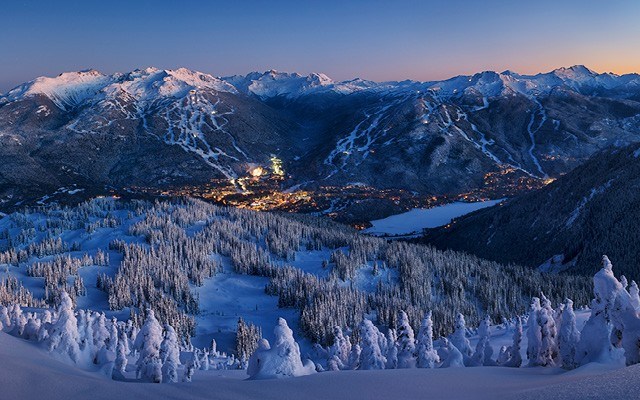The upcoming season could yield some of the best ski conditions in years.
That's according to AccuWeather, which is calling for plenty of snow and stormy weather throughout B.C. this winter.
"Heavy snow will quickly pile up in the mountains, which should get the Western ski season off to a good start," said Brett Anderson, a senior meteorologist with AccuWeather.
"This will allow ski resorts in British Columbia and Alberta to establish a solid base early in the season that will last through the spring."
Speaking on the line from Pennsylvania, Anderson said that snow hounds have La Niña to thank. Although earlier forecasts indicated that this particular weather pattern would be strong this winter, its status has since been downgraded to weak — but it will still influence the weather across Western Canada, including Whistler.
"The official forecast we have is for a fairly stormy December and near-to-slightly above normal temperatures across western B.C., so for ski areas that's a good thing — December should be cold enough in general in Whistler for snow," Anderson said.
"We expect snowier-than-normal conditions during the month of December in Whistler and, as we get into January, February, our thinking is that the storm track would shift farther north and high pressure would build along the coast, leading us into a drier pattern for January and February — not necessarily warm, but we're looking at near-normal temperatures during those months.
"Winter should see a fair amount of storminess during the first half of winter, which should establish a fairly good base across the mountains of snow," he added. "There should be drier conditions thereafter but no basis for them to be significant. Combined with near-normal temperatures we're in pretty good shape for the ski season this year."
The drop in the frequency of storms heading into February and March will also bring the potential for some brief shots of Arctic air all the way down to the Lower Mainland, he noted.
So while it sounds like the 2016-17 season will be a good one, here's the catch with weather outlooks: they depend on whom you ask.
Environment and Climate Change Canada operational meteorologist Ross Macdonald told Pique that there is about a 60- to 70-per-cent chance that La Niña will indeed be in effect this season, but if it does in fact occur, it will be "quite weak."
"It's more likely to be a weak-to- neutral pattern — so a very, very average winter in terms of the climatological signal to look for," Macdonald said. "It may be slightly colder than normal leaning to a neutral signal, which is the climatological norm."
Senior meteorologist David Jones, with Environment and Climate Change Canada, meanwhile, said that his prediction for what the winter ahead will look like is no prediction at all.
"No one can tell anyone anything of value about what a season is going to be like," Jones said.
"Meteorologists are focused on the short term. There's a myth out there that meteorologists know something about seasonal forecasting, and the truth is they don't. There's nothing I or anyone else who's actually qualified to do so can tell you about the character of this winter's weather."
Jones went on to explain: "There's the nonsense that happens every year: that it's going to be a crazy winter or the coldest winter, or super warm and the skiing is going to be terrible.
"You'd think all of us who have lived these hysterical projections and lived to see them mostly turn out always wrong, that we would kind of get it after a while. To me, the most interesting thing is what is preventing people from starting to learn something about the weather and climate. Why are we so easily misled? You're going to get what you're going to get."
Environment and Climate Change Canada warning-preparedness meteor-ologist Matt MacDonald, who's an avid skier himself, noted that the winter of 1997-98 was almost identical to this past winter. What followed during the winter of 1998-99 was epic snowfall.
"That was the year that Mount Baker set the world record for snowfall," he said. However, he too cautions that the projections for La Niña have been downgraded from strong to weak and that we shouldn't get too excited about what's to come this season.
When La Niña is strong, it can have a tremendous impact. Whistler Mountain's snow-base record of 503 centimetres was set in 1973-74, the same year the weather pattern got that mighty La Niña distinction. According to the Oceanic Niño Index, La Niña has been classified as strong two other times since 1950, in 1975-76 and 1988-89.




